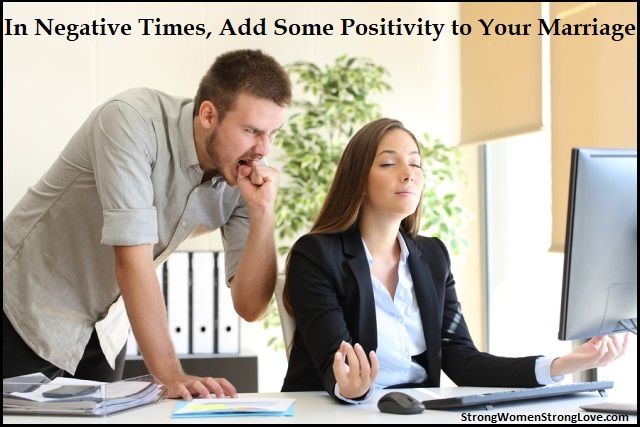by Strong Women Strong Love | May 14, 2018 | Poisonous Patterns |

He’s talking a lot about his new co-worker. What if they’re having an affair?
He always gets so mad when I ask him to do things at home. What if I push him too hard and he leaves?
He isn’t taking care of himself like the doctor told him to. What if he gets really sick and I’m left to deal with things by myself?
Do you ever get scared and then lose yourself in doubts about your husband? Sometimes “what ifs” can be a sign that there are some trust issues in your marriage. But the person you mistrust may not be the one you think.
Is This Really Something to Worry About?
If you’re often troubled by worries like the ones above, a good first step is to investigate how valid your fears are.
Let’s take the example of that new co-worker your husband is chatting about. If you feel like this is part of a bigger pattern (he’s had an emotional affair before, there are other issues in your relationship), then there might indeed be reason for concern. But if he’s loyal, reliable and generally happy in your marriage, it’s a good sign that he is talking to you about her. He is probably worthy of your trust. Similarly, an irritated husband may be trustworthy, but simply overwhelmed by the pressures of work and just needing some breathing room, not a divorce.
If you can’t quell your anxieties even though you know on a rational level that they’re baseless, then it’s time to ask yourself another question.
Instead of pondering whether you trust him, consider whether you trust yourself.
The Root of Your Fears
When you’re constantly plagued by irrational fears about your husband, that insecurity may come from lack of trust in your own ability to handle life. On some level, you might literally believe you won’t be able to cope if he really is cheating (or if whatever other scenario you’re worried about turns out to be true).
It’s important to remember that everyone will let you down sometimes, in big or small ways. You can’t keep that from happening. But you can cultivate your own resilience and confidence in yourself. Without self-trust, you risk becoming clingy, needy, or jealous, making it much more likely your husband would need to get some distance from you. Desperation and mistrust are good ways to drive off even the best of men.
Cultivate Self-Trust
As psychotherapist and author Cynthia Wall writes, you have to trust yourself before you can develop trusting connections with others. Learning to take care of your own needs — something busy wives and moms often forget — helps build self-trust. So does being kind and compassionate with yourself, the opposite of the perfectionism that pervades our lives these days. Little crises with others, including your husband, will seem less catastrophic when you feel more confident in your own skills.
Reminding yourself that your husband can’t be there for you 100% may seem depressing at first, but doesn’t necessarily make him untrustworthy. Rationally examining his devotion to you is important. If you figure out that you have mistakenly assumed the worst about him, don’t forget that research affirms the power of couples to repair big and small rifts in their marriages. If others can do it, so can you!
One resource that can help you trust yourself and your relationship is my book Strong Women, Strong Love. In it, you’ll find many more practical strategies like the ones in this article.
by Strong Women Strong Love | May 13, 2018 | Parenthood, Personal Power, Quotes |

When a woman makes the choice to marry, to have children,
in one way her life begins but in another way it stops.
You build a life of details.
You become a mother, a wife and you stop and
stay steady so that your children can move.
And when they leave they take
your life of details with them.
And then you’re expected to move again
only you don’t remember what moves you because
no one has asked in so long.
Not even yourself.
~ Francesca ~ The Bridges of Madison County
by Strong Women Strong Love | Apr 30, 2018 | Persistent Pressures, Poisonous Patterns |

Have you noticed how easy it is to spend your entire day under a cloud of negativity?
There is no shortage of upsetting headlines in the news. If you dare to read the online comments of news stories, the degree of negativity and rudeness can be mind boggling! Turn to your social media feeds and there are complaints and criticism everywhere.
Even at work, how many times a day do you and your colleagues “vent” about what’s wrong?
All that negativity takes its toll and can spill over into your marriage. It’s hard to turn off the habit of fault finding and looking for problems, even when you’re with people you care the most about.
Spouses can be especially easy targets for such negativity. But for the health of your marriage, it’s important to, as the old song says, accentuate the positive.
Here’s what can help:
1. Intentionally Build a Positive Space.
Your marriage can be a fortress of optimism that helps you cope with the sea of negativity around you. But building a marriage like this requires being deliberate and focused. It’s too easy to fall into negativity, so you have to repeatedly choose to be positive. If you can do this, you will find the upbeat nature of your relationship invaluable to your well being.
Marriage research reveals that couples with the strongest marriages have about 20 positive interactions for every negative one. Even when there is conflict in these marriages, the ratio is still five positives for every negative. For struggling marriages, on the other hand, the number is closer to 0.8 positives for every negative. Keep these numbers in mind if you want the type of marriage that will buffer you from outside pessimism.
2. Take Care of Yourself.
When you’re stressed and really busy, getting to that positive place isn’t easy. That’s because a stressed brain is hardwired to look for what’s wrong. Studies have shown that under heavy stress, couples have more difficulty seeing the positives in their relationship and usually magnify anything negative that is happening. This is just one important reason to take a break to mitigate your stress. When you’re calmer, you’ll be able to see your spouse more accurately. Take some time for you, so that your time together will be more constructive.
3. Notice the Good Things.
To counteract the strong tendency to focus on the negative, make an extra effort to notice what’s working well in your relationship and talk about it. Most people are starving to be noticed and appreciated, and your husband is no exception.
What are your best moments with him? Which of his qualities make you feel grateful you’re married to him? Have you told him any of this recently?
Pay special attention to the end of the day when the two of you reconnect. It’s easy to turn this crucial time into a gripe session. But think about how much better it would be if you shared some good news and expressed how glad you are to see each other instead.
You may not have any control over what happens in politics or national and world affairs, but you can take steps toward positivity that make a real difference in your marriage. Give the ideas in this article a try. And if you’d like to discover more strategies like these, pick up a copy of my book Strong Women, Strong Love.
by Strong Women Strong Love | Apr 17, 2018 | Poisonous Patterns, Quotes |

“There’s nothing that harshness does that loving firmness doesn’t do better.”
~Terry Real
by Strong Women Strong Love | Apr 17, 2018 | Passionate Partnership, Personal Power |

You probably know about the importance of diversifying when it comes to your finances. You understand, for example, that it’s unwise to have all of your money invested in the stock of one company.
But diversification is also important to keep in mind for your marriage. I was reminded of this truth while listening to a recent NPR Hidden Brain segment with Shankar Vedantam. He spoke with Eli Finkel, a social psychologist at Northwestern University, about how our rising expectations of marriage can create problems in our relationships.
Here’s how Finkel explains it. Before you got married, you likely turned to a wider circle of people to fill your different needs as a person. For example, you had fun nights out with your neighbors, you talked about your goals with your favorite colleagues, you kept fit with your yoga class and you confided in your best friend from college. If you still have that variety of people in your life, pat yourself on the back. What tends to happen when we marry, though, is that our circles shrink. The perception has built up in our culture that your spouse should be able to be everything to you since he’s your “soul mate.”
We haven’t always thought about marriage in such exalted terms. If you read my blog post about psychotherapist and author Esther Perel, Finkel’s ideas might remind you of hers. Perel writes:
We still want everything the traditional family was meant to provide—security, respectability, property, and children—but now we also want our partner to love us, to desire us, to be interested in us. We should be best friends and trusted confidants, and passionate lovers to boot.
We want our chosen one to offer stability, safety, predictability, and dependability. And we want that very same person to supply awe, mystery, adventure, and risk. We expect comfort and edge, familiarity and novelty, continuity and surprise. We have conjured up a new Olympus, where love will remain unconditional, intimacy enthralling, and sex oh so exciting, with one person, for the long haul. And the long haul keeps getting longer.
This all puts a lot of pressure on our marriages. And, sadly, it can even set you up for added heartbreak if you lose a spouse to divorce or death. Kristi Williams, an Ohio State University sociologist and editor of The Journal of Marriage and Family, believes that many of the problems divorced or widowed people suffer are because they over-relied on their spouse.
You will be happier and your marriage will be healthier if you can diversify your relationship portfolio. Here are a couple of ideas to try.
It’s easy to forget one of the most important relationships — the one you have with yourself. If you feel that you’ve lost some of who you are since you’ve been married, start making it a priority to be yourself and value yourself. Do your own thing sometimes. Take a class in something you’re interested in, even if it’s not his thing and he doesn’t want to join you. Revisit the dreams and interests you’ve been neglecting. You’ll feel more engaged and alive, which — bonus! — makes you more attractive to your husband.
You can also start rekindling some of the relationships you’ve let slide to the back burner. Elaine Cheung of Northwestern University has found that having a larger array of relationships to help you manage all the emotions of life makes you happier. And when you have additional emotional support sources besides your husband, you’re more likely to appreciate the unique role he does play in your life.
For more ideas like these, pick up a copy of my book Strong Women, Strong Love. It’s a comprehensive guide to caring for your marriage and yourself.






